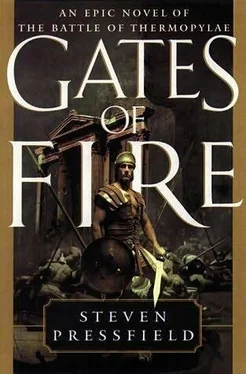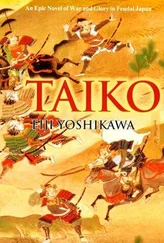Steven Pressfield - Gates of Fire - An Epic Novel of the Battle of Thermopylae
Здесь есть возможность читать онлайн «Steven Pressfield - Gates of Fire - An Epic Novel of the Battle of Thermopylae» весь текст электронной книги совершенно бесплатно (целиком полную версию без сокращений). В некоторых случаях можно слушать аудио, скачать через торрент в формате fb2 и присутствует краткое содержание. Жанр: Историческая проза, на английском языке. Описание произведения, (предисловие) а так же отзывы посетителей доступны на портале библиотеки ЛибКат.
- Название:Gates of Fire: An Epic Novel of the Battle of Thermopylae
- Автор:
- Жанр:
- Год:неизвестен
- ISBN:нет данных
- Рейтинг книги:3 / 5. Голосов: 1
-
Избранное:Добавить в избранное
- Отзывы:
-
Ваша оценка:
- 60
- 1
- 2
- 3
- 4
- 5
Gates of Fire: An Epic Novel of the Battle of Thermopylae: краткое содержание, описание и аннотация
Предлагаем к чтению аннотацию, описание, краткое содержание или предисловие (зависит от того, что написал сам автор книги «Gates of Fire: An Epic Novel of the Battle of Thermopylae»). Если вы не нашли необходимую информацию о книге — напишите в комментариях, мы постараемся отыскать её.
Gates of Fire: An Epic Novel of the Battle of Thermopylae — читать онлайн бесплатно полную книгу (весь текст) целиком
Ниже представлен текст книги, разбитый по страницам. Система сохранения места последней прочитанной страницы, позволяет с удобством читать онлайн бесплатно книгу «Gates of Fire: An Epic Novel of the Battle of Thermopylae», без необходимости каждый раз заново искать на чём Вы остановились. Поставьте закладку, и сможете в любой момент перейти на страницу, на которой закончили чтение.
Интервал:
Закладка:
In fact this was the selfsame strategy adopted by Leonidas and the allied commanders. These kept the Spartans back, choosing to honor, after much debate and discussion, the warriors of Thespiae. These were granted first position and now, on the morning of the fifth day, stood formed in their ranks, sixty-four shields across, upon the dance floor formed by the Narrows at the apex, the mountain wall on one side, the cliffs dropping to the gulf on the other and the reconstructed Phokian Wall at the rear.
This, the field of slaughter, comprised an obtuse triangle whose greatest depth lay along the southern flank, that which was anchored by the mountain wall. At this end the Thespians were drawn up eighteen deep. At the opposing end, alongside the drop-off to the sea, their shields were staggered to a depth of ten. This force of the men of Thespiae totaled approximately seven hundred.
Immediately to their rear, atop the Wall, stood the Spartans, Phliasians and Mycenaeans, to a total of six hundred. Behind these every other allied contingent was likewise drawn up, all in full panoplia.
Two hours had elapsed since the enemy had first been sighted, half a mile down the track to Trachis, and still no motion had come. The morning was hot. Down the track, the roadway widened into an open area about the size of the agora of a small city. There, just after dawn, the lookouts had espied the Medians assembling. Their numbers were about four thousand. These, however, were only the foe who could be seen; the shoulder of the mountain hid the trail and the marshaling stations beyond.
One could hear the enemy trumpets and the shouted orders of their officers moving more and more men into position beyond the shoulder. How many more thousands massed there out of sight?
The quarter hours crawled by. The Medes continued marshaling, but did not advance. The Hellenic lookouts began shouting insults down at them. Back in the Narrows, the heat and other exigencies had begun to work on the chafing, impatient Greeks. It made no sense to sweat longer under the burdens of full armor. Dump 'em but be ready to hump 'em! Dithyrambos, the Thespian captain, called out to his coun-trymen in the coarse slang of his city. Squires and servants dashed forward among the ranks, each assisting his man in disencumbering himself of breastplate and helmet. Corselets were loosened. Shields rested already against knees. The felt undercaps which the men wore beneath their helmets came off and were wrung like bath linens, saturated with sweat. Spears were plunged at the position of rest, butt-spike-first, into the hard dirt, where they stood now in their numbers like an iron-tipped forest. The troops were permitted to kneel. Squires with skins of water circulated, replenishing the parched warriors. It was a safe bet that many skins contained refreshment more potent than that scooped from a spring. As the delay grew longer, the sense of unreality heightened. Was this another false alarm, like the previous four days? Would the Persian attack at all?
Snap out of those daydreams! an officer barked.
The troops, bleary-eyed and sun-scorched, continued eyeing Leonidas on the Wall with the commanders. What were they talking about? Would the order come to stand down?
Even Dienekes grew impatient. Why is it in war you can't fall asleep when you want to and can't stay awake when you have to? He was just stepping forward to address a steadying word to his platoon when from out front among the foreranks rose a shout of such intensity that it cut his words off in midbreath. Every eye swung skyward.
The Greeks now saw what had caused the delay.
There, several hundred feet above and one ridgeline removed, a party of Persian servants escorted by a company of their Immortals was erecting a platform and a throne.
Mother of bitches. Dienekes grinned. It's young Purple Balls himself.
High above the armies, a man of between thirty and forty years could be descried plainly, in robes of purple fringed with gold, mounting the platform and assuming his station upon the throne. The distance was perhaps eight hundred feet, up and back, but even at that range it was impossible to mistake the Persian monarch's surpassing handsomeness and nobility of stature.
Nor could the supreme self-assurance of his carriage be misread even at this distance. He looked like a man come to watch an entertainment. A pleasantly diverting show, one whose outcome was foreordained and yet which promised a certain level of amusement. He took his seat. A sunshade was adjusted by his servants. We could see a table of refreshments placed at his side and, upon his left, several writing desks set into place, each manned by a secretary.
Obscene gestures and shouted insults rose from four thousand Greek throats.
His Majesty rose with aplomb in response to the jeers. He gestured elegantly and, it seemed, with humor, as if acknowledging the adulation of his subjects. He bowed with a flourish. It seemed, though the distance was too great to be sure, as if he were smiling. He saluted his own captains and settled regally upon his throne.
My place was on the Wall, thirty stations in from the left flank anchored by the mountain. I could see, as could all the Thespians before the Wall and every Lakedaemonian, Mycenaean and Phliasian atop it, the captains of the enemy, advancing now to the sound of their trumpets, in the van before the massed ranks of their infantry. My God, they looked handsome. Six division commanders, each, it seemed, taller and nobler than the next. We learned later that these were not merely the flower of the Median aristocracy, but that their ranks were reinforced by the sons and brothers of those who had been slain ten years earlier by the Greeks at Marathon. But what froze the blood was their demeanor. Their carriage shone forth, bold to the point of contemptuous. They would brush the defenders aside, that's what they thought. The meat of their lunch was already roasting, back down in camp. They would polish us off without raising a sweat, then return to dine at their leisure.
I glanced to Alexandras; his brow glistened, pale as a winding sheet; his wind came in strangled, wheezing gasps. My master stood at his shoulder, one pace to the fore. Dienekes' attention held riveted to the Medes, whose massed ranks now filled the Narrows and seemed to extend endlessly beyond, out of sight along the track. But no emotion disclari-fied his reason. He was gauging them strategically, coolly assessing their armament and the bearing of their officers, the dress and interval of their ranks. They were mortal men like us; was their vision struck, like ours, with awe of the force which stood now opposed to them? Leonidas had stressed again and again to the officers of the Thespians that their men's shields, greaves and helmets must be bossed to the most brilliant sheen possible. These now shone like mirrors. Above the rims of the bronzefaced aspides, each helmet blazed magnificently, overtopped with a lofty horsehair crest, which as it trembled and quavered in the breeze not only created the impression of daunting height and stature but lent an aspect of dread which cannot be communicated in words but must be beheld to be understood.
Adding further to the theater of terror presented by the Hellenic phalanx and, to my mind most frightful of all, were the blank, expressionless facings of the Greek helmets, with their bronze nasals thick as a man's thumb, their flaring cheekpieces and the unholy hollows of their eye slits, covering the entire face and projecting to the enemy the sensation that he was facing not creatures of flesh like himself, but some ghastly invulnerable machine, pitiless and unquenchable. I had laughed with Alexandros not two hours earlier as he seated the helmet over his felt undercap; how sweet and boyish he appeared in one instant, with the helmet cocked harmlessly back upon his brow and the youthful, almost feminine features of his face exposed.
Читать дальшеИнтервал:
Закладка:
Похожие книги на «Gates of Fire: An Epic Novel of the Battle of Thermopylae»
Представляем Вашему вниманию похожие книги на «Gates of Fire: An Epic Novel of the Battle of Thermopylae» списком для выбора. Мы отобрали схожую по названию и смыслу литературу в надежде предоставить читателям больше вариантов отыскать новые, интересные, ещё непрочитанные произведения.
Обсуждение, отзывы о книге «Gates of Fire: An Epic Novel of the Battle of Thermopylae» и просто собственные мнения читателей. Оставьте ваши комментарии, напишите, что Вы думаете о произведении, его смысле или главных героях. Укажите что конкретно понравилось, а что нет, и почему Вы так считаете.












